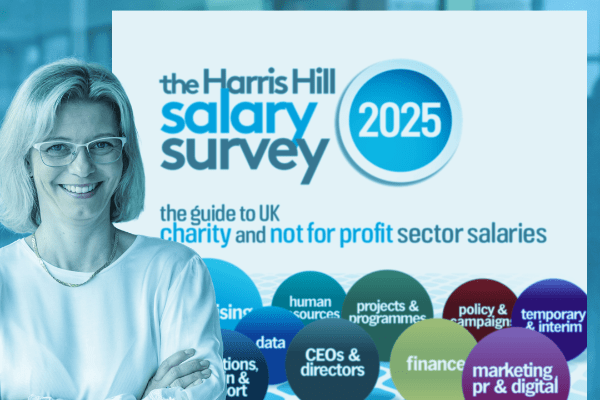Our very own director and deputy CEO Faye Marshall has recruited for countless charities, visiting all kinds of offices in the course of her career.
So back in December, as part of their Wonderful Workplaces initiative, Third Sector Jobsasked for her thoughts on the kind of workplaces that appeal to candidates, and how charities can make sure they're an attractive prospect for the people they need.
Read below for the full interview, reproduced with many thanks to Third Sector Jobs.


Faye Marshall, Harris Hill
TS: Why do you think it's important for charities to highlight their working culture and benefits?
FM: In most areas of the market there are plenty of opportunities but a shortage of candidates, so charities are competing for the best talent. Candidates frequently have several offers at once, but as few organisations can afford to outbid the others with major increases, the salaries may all be fairly similar. So things like the working environment, culture, values and benefits can really make a difference to which offer gets accepted.
What are some of the best charities you work with doing to attract top talent?
There are great initiatives happening in some organisations around flexible working - for example giving staff the opportunity to choose the times of their working day, provided they're present for agreed core hours (e.g. 11am-3pm) to allow for staff meetings. This means that candidates with all the right skills and qualities aren't excluded solely because they can't do a standard Monday to Friday 9-5 week, and gives these charities more choice of available talent.
Other organisations are offering incentives such as paid travel to work or time off for volunteering, and an increasing number of charities are signing up to become accredited Living Wage Employers, which reflects well on the employer and is attractive for candidates. One aspect of the accreditation is that unpaid interns can no longer be used to fill staffing gaps, with most of the work going instead to freelancers and contractors. As a result there are more opportunities to gain paid experience within the sector and in the long term, everyone should benefit from a larger pool of experienced talent.
In your experience, would you say candidates place most importance on a high salary or are other aspects like work/life balance now more important? Or perhaps they expect both?
It's usually a combination of both (if a candidate were purely motivated by salary they probably wouldn't be looking to the charity sector!) but the balance very much depends on individual circumstances and the stage of their career.
In general, at more junior levels there's understandably a greater desire to progress in terms of position and salary; whereas at more senior levels where they're perhaps more settled and financially comfortable, other factors like the working environment, flexibility and time off for looking after family may become more important.
How would you describe a great team culture?
Supportive management, plenty of co-operation and willingness to help each other out - good teamwork essentially. Variety and diversity are important too: teams with a mix of personalities and skills that complement each other are undoubtedly more effective than a collection of clones who all have the same strengths and weaknesses.
A positive approach and celebrating people's achievements is always valued, and when it comes to socialising, the key is to ensure that everyone feels welcome if they want to, but not excluded from the in-crowd if they don't, or have other responsibilities to attend to.
What should jobseekers look for in a great place to work?
A good charity employer should be able to give you a clear understanding of their strategy, what they're trying to achieve and how you'd contribute to that within your role. You'll pick up a lot from the interview process - many interviewers forget that it's not just the candidate who needs to make a good impression - but if you're made to feel welcome and comfortable, shown around or introduced to more people, these are all good signs.
Try to find out if people tend to stay and develop a career there, or is it somewhere no-one stays for long? Will you be trusted to do your job, or micro-managed to the tiniest degree?
Lastly, don't assume that the biggest, best-known and most successful charities are automatically the best employers too. Many are indeed excellent of course but it's not necessarily a given: plenty of smaller, lesser-known organisations are equally good employers, and among fewer employees there may be a greater chance of taking on more responsibility.
And how can they find out whether the culture is right for them?
It's an obvious answer, but one of the easiest ways is to talk to us! Or at least another specialist recruiter. As we've always specialised in the charity sector it's more than likely we know the organisation and may have worked with them for many years. If we also know your personality as a candidate we'll be well placed to advise on whether you're likely to feel at home.
Don't forget to ask plenty of questions at the interview; and why not ask to see around if you can (do people look happy and enthusiastic or stressed out in despair?)
Look out for events run by the charity where you could chat to people who work there now - or better still, volunteer! Not only will you get to see what they're really like but it'll show commitment to their cause, a definite plus if you go for an interview.
Lastly, how would you sum up what makes a 'wonderful workplace'?
Everyone's different, so everyone's perfect workplace will be different too - but the essentials are likely to include a good fit with your colleagues, supportive management with clear aims and a positive approach, and somewhere your efforts will be welcomed and valued.
But whether you're more attracted by flexible hours, fast-track progression or Friday night drinks will always be a personal and subjective thing, which is why it can be genuinely helpful to chat with one of our specialist recruitment consultants who really knows the field.
Faye Marshall, Director of Permanent Recruitment and Deputy CEO, Harris Hill, interviewed by Jennifer Jackson for Third Sector Jobs in December 2017.
You can contact Faye here, read more about how we work, or find more features on Wonderful Workplaces via Third Sector Jobs.
-

Opportunity for all
Find out how we’re working to deliver more diverse, equitable and inclusive recruitment…
-

Recruiting a charity CEO?
Our executive recruitment specialists have an exceptional record of successful CEO, chair, trustee and…
-

Charity sector salaries
Our 2025 Salary Survey has the latest rates and expert insight for roles throughout the sector.













